GALLUP NEWS SERVICE
PRINCETON, NJ -- Majorities of Americans say neither Israeli Prime Minister Ariel Sharon nor Palestinian leader Yasser Arafat wants peace with the other side, according to a new CNN/USA Today/Gallup poll. The poll also shows that while a majority of Americans think President George W. Bush is doing enough to find a peaceful solution to the Middle East conflict, a substantial minority thinks the United States supports Israel "too much."
Conducted June 7-8, the poll finds that by a margin of 57% to 32%, Americans think Sharon does not "genuinely" want peace with the Palestinians. By an even larger margin of 76% to 16%, Americans also think that Arafat does not "genuinely" want peace with the Israelis.
| Does Sharon / Arafat Genuinely Want Peace? |
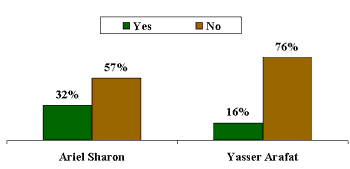 |
| June 7-8, 2002 |
Although previous Gallup polls have shown that Republicans are more supportive of Israel than are Democrats, the current poll shows little difference among partisan groups on whether Sharon genuinely wants peace. By margins of from 20 to 30 percentage points, each group shows a clear majority saying Sharon does not want peace.
| Sharon's Attitudes Toward Peace: By Party |
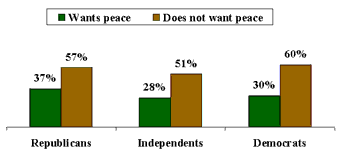 |
| June 7-8, 2002 |
Large majorities of each partisan group also say Arafat does not genuinely want peace, with Republicans more likely to take that point of view than independents or Democrats. Still, even Democrats show a 48-point margin of skepticism about Arafat, with only 21% saying he wants peace and 69% saying he does not.
| Arafat's Attitudes Toward Peace: By Party |
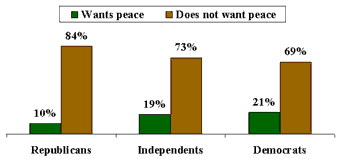 |
| June 7-8, 2002 |
U.S. Support for Israel: Americans Divided Between Saying "Too Much" or "Right Amount"
For the first time since the question was initially asked last October, a plurality of Americans -- 43% -- say that the United States gives too much support to Israel, while 40% say this country gives about the right amount of support. Another 10% say the support is "too little." These figures represent a significant decline in a pro-Israeli point of view over the last eight months.
In four previous polls, all taken since the Sept. 11 terrorist attacks, at least a plurality of Americans indicated that U.S. support was the right amount. As recently as April, Americans expressed that view by a margin of 49% to 35%. In the month after the Sept. 11 attacks, Americans said the United States was supporting Israel the right amount rather than too much, by a two-to-one margin, 58% to 29%.
| U.S. Support for Israel |
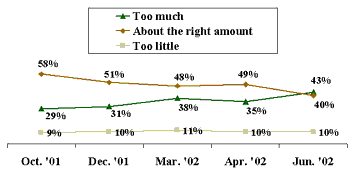 |
On this question, there are major differences among partisan groups. While a plurality of Republicans say the United States supports the Israelis the right amount (47%) rather than too much (36%), a majority of Democrats (51%) say U.S. support is too much, while only 32% say it is the right amount. Independents are about evenly divided between the two points of view. For all three groups, another 7% to 12% say U.S. support is too little.
| Support for Israel: By Party |
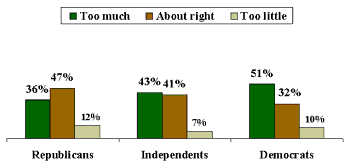 |
| June 7-8, 2002 |
Bush doing enough to find peaceful solution?
Overall, 61% of Americans say Bush is doing enough to find a peaceful solution to the conflict between the Israelis and the Palestinians, while 28% say he is not. As is typical in response to a question that mentions the president by name, partisan differences are quite substantial. Republicans give a positive evaluation of Bush's efforts by 77% to 15%, and independents by 58% to 30%. Democrats, however, are about evenly divided as to whether Bush is doing enough: 45% think he is, 43% think he is not.
| Is Bush Doing Enough to Find a Peaceful
Solution: By Party |
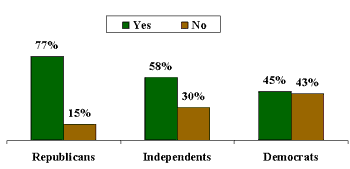 |
| June 7-8, 2002 |
Survey Methods
The latest results are based on telephone interviews with 800 national adults, aged 18+, conducted June 7-8, 2002. For results based on the total sample of national adults, one can say with 95% confidence that the margin of sampling error is ±3 percentage points. In addition to sampling error, question wording and practical difficulties in conducting surveys can introduce error or bias into the findings of public opinion polls.
Turning to the Middle East,
Do you think the United States supports Israel -- [ROTATED: too much, about the right amount, or too little]?
|
|
|
About the |
|
No |
|
|
% |
% |
% |
% |
||
|
2002 Jun 7-8 |
43 |
40 |
10 |
7 |
|
|
2002 Apr 5-7 |
35 |
49 |
10 |
6 |
|
|
2002 Mar 1-3 |
38 |
48 |
11 |
3 |
|
|
2001 Dec 14-16 ^ |
31 |
51 |
10 |
8 |
|
|
2001 Oct 19-21 |
29 |
58 |
9 |
4 |
|
|
^ |
Asked of a half sample. |
||||
Do you think George W. Bush is -- or is not-- doing enough to find a peaceful solution to the conflict between the Israelis and Palestinians?
|
Yes, is |
No, is not |
No opinion |
|
|
2002 Jun 7-8 |
61% |
28 |
11 |
Thinking about Israeli Prime Minister Ariel Sharon and Palestinian leader Yasser Arafat [questions rotated],
Do you think that Ariel Sharon genuinely wants peace with the Palestinians, or not?
|
Yes, wants |
No, does not |
No opinion |
|
|
2002 Jun 7-8 |
32% |
57 |
11 |
Do you think Yasser Arafat genuinely wants peace with the Israelis, or not?
|
Yes, wants |
No, does not |
No opinion |
|
|
2002 Jun 7-8 |
16% |
76 |
8 |
